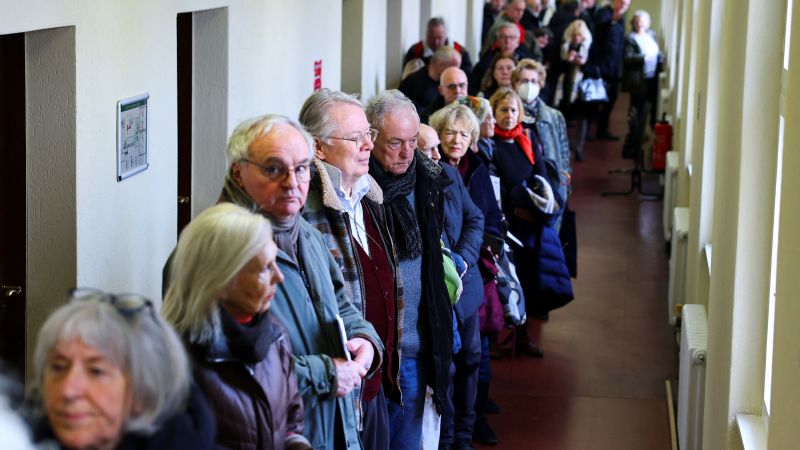The AfD Party In Germany: Ideology, Influence, And International Connections

Table of Contents
The AfD's Rise: From Euroscepticism to Mainstream Politics and International Ties
Berlin, Germany – The Alternative for Germany (AfD), once a fringe party focused primarily on Euroscepticism, has become a significant force in German politics, sparking considerable debate about its ideology, influence, and international connections. Its trajectory reveals a complex evolution, marked by internal divisions and shifting alliances, raising questions about its long-term impact on the German political landscape and its relationship with similar movements abroad.
The party’s initial platform centered on opposition to the Euro and the perceived overreach of the European Union. This resonated with voters disillusioned by economic hardship and the perceived failures of mainstream parties to address their concerns. However, over time, the AfD's ideology has broadened, incorporating elements of right-wing populism, nationalism, and social conservatism. While initially dominated by economists and fiscal conservatives, the party's internal power dynamics have shifted, with a more nationalist and culturally conservative faction gaining prominence. This has led to significant internal clashes and the departure of more moderate members.
The party's influence is undeniable. While not currently in government at the federal level, the AfD holds seats in the Bundestag (the German federal parliament) and numerous state parliaments (Landtage). Its electoral success varies regionally, with stronger support in the former East Germany, where economic disparities and a sense of neglect persist. The AfD's influence extends beyond its parliamentary representation. Its rhetoric and talking points shape the political discourse, forcing mainstream parties to address issues like immigration and integration in ways that previously would have been considered outside the mainstream. This has undeniably shifted the Overton window in Germany. However, the AfD's influence is frequently contested and met with strong opposition from civil society groups and other political parties who highlight the party's often controversial statements and policies.
The AfD’s international connections are a subject of ongoing scrutiny. The party has faced criticism for its perceived links with other far-right and populist movements across Europe. While formal alliances are limited, there is evidence of ideological convergence and informal cooperation with parties sharing similar anti-EU, anti-immigrant, and nationalist viewpoints. This includes connections with parties in countries like Italy (e.g., the Brothers of Italy, though the nature and extent of the connection is debated), France (e.g., elements within the National Rally), and Poland (e.g., certain factions within the ruling Law and Justice party). These connections are often characterized by the exchange of ideas, shared rhetoric, and mutual support during election campaigns. However, the degree of formal coordination remains a subject of ongoing investigation and analysis by political scientists and researchers. The AfD denies any organized, coordinated international network but acknowledges sharing similar policy positions with other Eurosceptic and nationalist parties.
The future of the AfD remains uncertain. Internal divisions and the ongoing struggle for dominance between different factions within the party could hinder its long-term prospects. However, its ability to tap into widespread societal anxieties regarding immigration, globalization, and the perceived failures of established political institutions suggests that it will likely remain a significant factor in German politics for the foreseeable future. The party’s impact on German society and its potential to further influence the European political landscape will continue to be closely observed by political analysts and the international community. The ongoing debate surrounding its ideology, influence, and international ties necessitates continued rigorous scrutiny and analysis. Understanding the AfD is crucial not only for understanding German politics but also the broader trends of right-wing populism in Europe and beyond.

Featured Posts
-
 Musk Questions Federal Workers Productivity Demands Explanations
Feb 25, 2025
Musk Questions Federal Workers Productivity Demands Explanations
Feb 25, 2025 -
 Remembering Lynne Marie Stewart Its Always Sunny Star Dead At 78
Feb 25, 2025
Remembering Lynne Marie Stewart Its Always Sunny Star Dead At 78
Feb 25, 2025 -
 Musk Ultimatum Explain Last Weeks Actions Or Face Job Losses
Feb 25, 2025
Musk Ultimatum Explain Last Weeks Actions Or Face Job Losses
Feb 25, 2025 -
 Tens Of Thousands The Mounting Death Toll Of Unreported Russian Soldiers In Ukraine
Feb 25, 2025
Tens Of Thousands The Mounting Death Toll Of Unreported Russian Soldiers In Ukraine
Feb 25, 2025 -
 Parking Nightmare Peak District Beauty Spot Costs Driver Dearly
Feb 25, 2025
Parking Nightmare Peak District Beauty Spot Costs Driver Dearly
Feb 25, 2025
Latest Posts
-
 The Impact Of Trumps Proposed Usps Changes On Mail Delivery
Feb 25, 2025
The Impact Of Trumps Proposed Usps Changes On Mail Delivery
Feb 25, 2025 -
 Investigation Launched Following Death Of Parisian Cyclist Paul Varry
Feb 25, 2025
Investigation Launched Following Death Of Parisian Cyclist Paul Varry
Feb 25, 2025 -
 Pms Peace Proposal Faces Challenges And Opposition
Feb 25, 2025
Pms Peace Proposal Faces Challenges And Opposition
Feb 25, 2025 -
 The Future Of Germany Understanding The Implications Of The Upcoming Election
Feb 25, 2025
The Future Of Germany Understanding The Implications Of The Upcoming Election
Feb 25, 2025 -
 Invisible Losses Russias Mounting Casualties In Ukraine
Feb 25, 2025
Invisible Losses Russias Mounting Casualties In Ukraine
Feb 25, 2025
